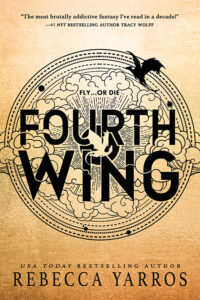
Fair to say I’m not the #BookTok demo — for my taste, tropes are bugs, not features, books older than five years are a-okay, and I’m not being sponsored to promote Barnes & Noble. And then we have to consider the genre’s favorite trope: the spicy scene, which, in my experience, few authors know how to actually write in a way that doesn’t rely on repetitious language encounter after encounter. In other words, the whole phenomenon seems fundamentally limiting from a reading perspective, located within some venn diagram nexus of fantasy, young adult, and lightly erotic rom (plus maybe some com). That said, I decided to give Fourth Wing a go anyway, based largely on the then (insanely inflated) Goodreads 4.8 star rating. (*Check notes* — it’s still at a 4.66 with just under 390,000 ratings.)
In fairness, the novel starts off pretty well. Briefly, Fourth Wing follows Violet, a frail 20-year-old aspiring scribe in a violent, war-mongering world where she is forced by her general mother to join an elite school wherein students either become bonded with a dragon and take up the coveted mantle of warrior riders, or they die. Of course, there’s also a dangerous bad boy who also happens to be pathologically irresistible to Violet, as these things go. Given the presence of dragons and schools of fantasy and broody young men, it’s no surprise that the novel is marketed to the #BookTok-endorsed New Adult genre that straddles the Adult/Young Adult line. But make no mistake: we’re pretty firmly in YA territory from the get — meaning the psychological and emotional continuums presented are fairly histrionic and unhealthy.
For all that, the world-building is actually pretty intriguing, even if the structural skeleton in the early going is entirely cribbed from Divergent, which is a woof of a novel in itself. But much like Stephanie Meyer — yes, I’m just name-checking a bunch of YA touchstones here so you understand exactly how derivative this is — Yarros shows skill with ending chapters, encouraging readers to push through with speed, even if there’s a bevy of eye rolls along the way. But the organization of the world built here is fairly appealing from a fantasy perspective, at least enough to encourage investment in watching it unfurl further.
But given the marketing angle, I’d be remiss if I didn’t get to the spice. Sorry, let me be more specific to this novel: the deranged approximation of some pubescent fantasy of sex, which feels dredged up from the perspective of some middle school diary. We’ll keep it PG here, but suffice it to say that the book’s attempts at an R-rating are not likely to please readers going in for such books. The brooding #badboi also claims that the main character here “is going to be the death of” him a dozen or more times, because Yarros just doesn’t seem to have any idea how to write characters who aren’t operating from a place of emotional stability. Instead, she just keeps recycling the same cliches ad nauseam, all of which indicate the need for therapeutic intervention rather than wedding bells. The whole thing scans more like the abandoned script for some SNL sketch sending up super-nerd fanfiction. I’ve read sexier phonebooks.
Again, a good half of this offers easy-reading and propulsive fantasy fun; plus the ending introduces a wrinkle that promises an expansion of the established world, which should appeal to fans of expansive series development. And readers inclined to this sort of thing already aren’t likely to find the faults I did; it’s classic mileage-may-vary kind of book, and I’m absolutely not the intended audience. But as a quick PSA to curious but perhaps hesitant fantasy fans: if you’re happy to take your novels sans loonies slobbering all over each other and decrying life’s meaning in the absence of unhealthy obsession, you should probably pop on over to the next shelf.

